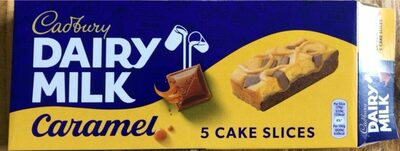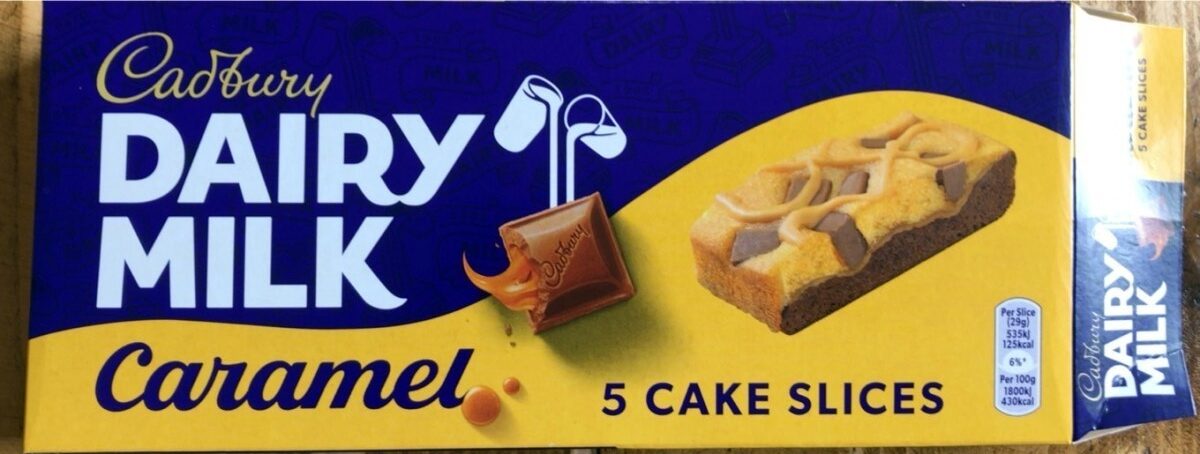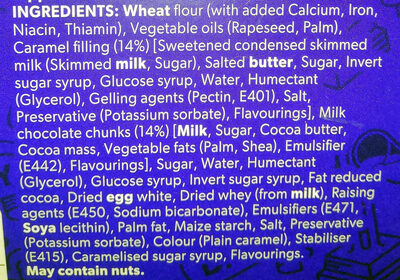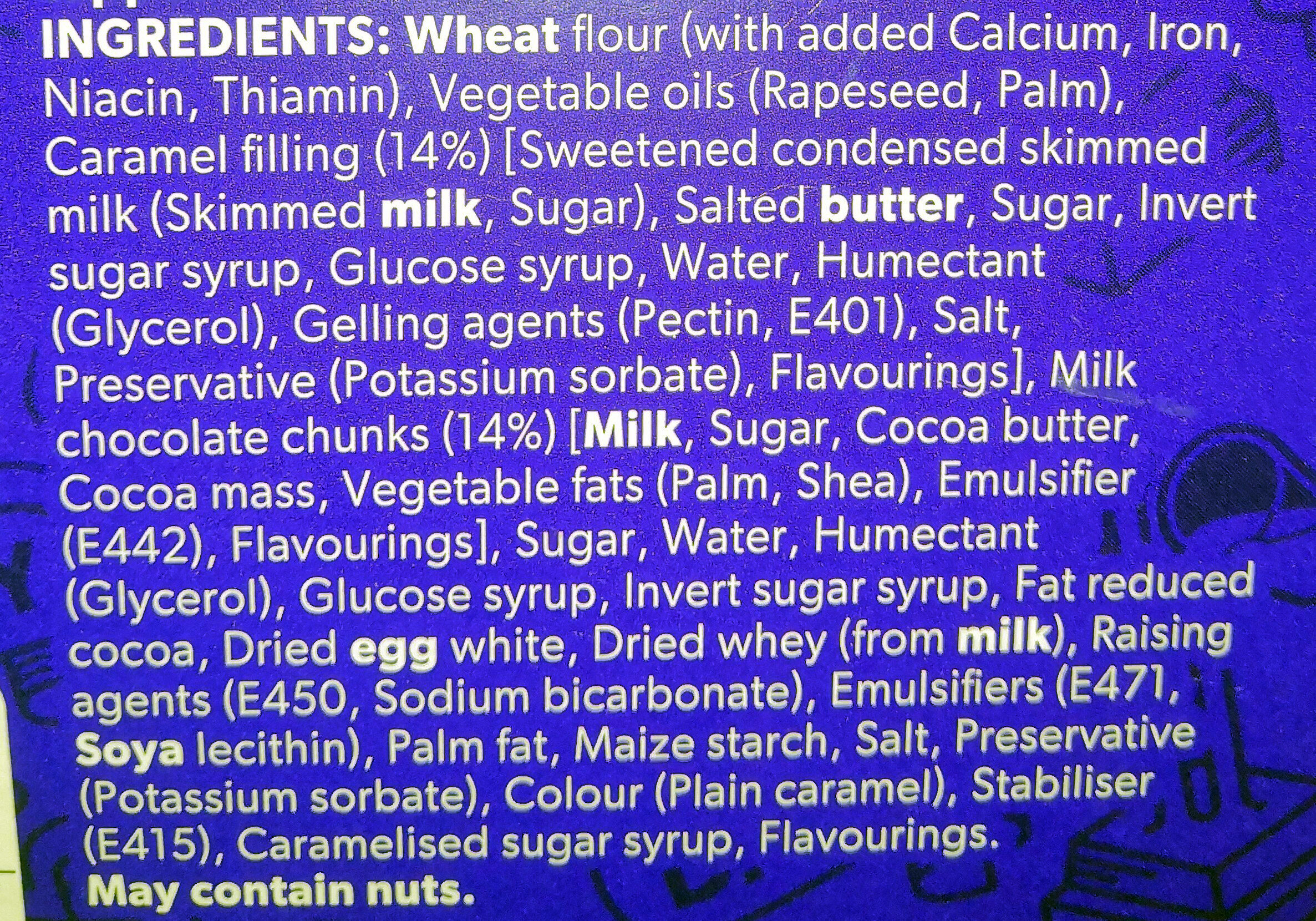Help us make food transparency the norm!
As a non-profit organization, we depend on your donations to continue informing consumers around the world about what they eat.
The food revolution starts with you!
Dairy milk caramel cake slices - Cadbury - 5
Dairy milk caramel cake slices - Cadbury - 5
This product page is not complete. You can help to complete it by editing it and adding more data from the photos we have, or by taking more photos using the app for Android or iPhone/iPad. Thank you!
×
Barcode: 5000221606703 (EAN / EAN-13)
Common name: Chocolate and caramel flavour sponge baked with milk chocolate chunks layered with a caramel filling, topped with a caramel colour decoration
Quantity: 5
Packaging:
Plastic, Card-box, Green dot
Brands: Cadbury
Categories: Snacks, Desserts, Sweet snacks, Biscuits and cakes, Cakes, Sponge cakes
Labels, certifications, awards:
Vegetarian, Green Dot
Countries where sold: United Kingdom
Matching with your preferences
Health
Ingredients
-
63 ingredients
Wheat flour (with added Calcium, Iron, Niacin, Thiamin), Vegetable oils (Rapeseed, Palm), Caramel filling 14% (Sweetened condensed skimmed milk (Skimmed milk, Sugar), Salted butter, Sugar, Invert sugar syrup, Glucose syrup, Water, Humectant (Glycerol), Gelling agents (Pectin, E401), Salt, Preservative (Potassium sorbate), Flavourings), Milk chocolate chunks 14% (Milk, Sugar, Cocoa butter, Cocoa mass, Vegetable fats (Palm, Shea), Emulsifier (E442), Flavourings), Sugar, Water, Humectant (Glycerol), Glucose syrup, Invert sugar syrup, Fat reduced cocoa, Dried egg white, Dried whey (from milk), Raising agents (E450, Sodium bicarbonate), Emulsifiers (E471, Soya lecithin), Palm fat, Maize starch, Salt, Preservative (Potassium sorbate), Colour (Plain caramel), Stabiliser (E415), Caramelised sugar syrup, Flavourings.Allergens: Eggs, Gluten, Milk, SoybeansTraces: Nuts
Food processing
-
Ultra processed foods
Elements that indicate the product is in the 4 - Ultra processed food and drink products group:
- Additive: E150a - Plain caramel
- Additive: E322 - Lecithins
- Additive: E401 - Sodium alginate
- Additive: E415 - Xanthan gum
- Additive: E422 - Glycerol
- Additive: E440 - Pectins
- Additive: E442 - Ammonium phosphatides
- Additive: E450 - Diphosphates
- Additive: E471 - Mono- and diglycerides of fatty acids
- Ingredient: Colour
- Ingredient: Emulsifier
- Ingredient: Flavouring
- Ingredient: Gelling agent
- Ingredient: Glucose
- Ingredient: Glucose syrup
- Ingredient: Humectant
- Ingredient: Invert sugar
- Ingredient: Whey
Food products are classified into 4 groups according to their degree of processing:
- Unprocessed or minimally processed foods
- Processed culinary ingredients
- Processed foods
- Ultra processed foods
The determination of the group is based on the category of the product and on the ingredients it contains.
Additives
-
E202 - Potassium sorbate
Potassium sorbate (E202) is a synthetic food preservative commonly used to extend the shelf life of various food products.
It works by inhibiting the growth of molds, yeast, and some bacteria, preventing spoilage. When added to foods, it helps maintain their freshness and quality.
Some studies have shown that when combined with nitrites, potassium sorbate have genotoxic activity in vitro. However, potassium sorbate is generally recognized as safe (GRAS) by regulatory authorities.
-
E322 - Lecithins
Lecithins are natural compounds commonly used in the food industry as emulsifiers and stabilizers.
Extracted from sources like soybeans and eggs, lecithins consist of phospholipids that enhance the mixing of oil and water, ensuring smooth textures in various products like chocolates, dressings, and baked goods.
They do not present any known health risks.
-
E322i - Lecithin
Lecithins are natural compounds commonly used in the food industry as emulsifiers and stabilizers.
Extracted from sources like soybeans and eggs, lecithins consist of phospholipids that enhance the mixing of oil and water, ensuring smooth textures in various products like chocolates, dressings, and baked goods.
They do not present any known health risks.
-
E415 - Xanthan gum
Xanthan gum (E415) is a natural polysaccharide derived from fermented sugars, often used in the food industry as a thickening and stabilizing agent.
This versatile food additive enhances texture and prevents ingredient separation in a wide range of products, including salad dressings, sauces, and gluten-free baked goods.
It is considered safe for consumption even at high intake amounts.
-
E422 - Glycerol
Glycerol: Glycerol -; also called glycerine or glycerin; see spelling differences- is a simple polyol compound. It is a colorless, odorless, viscous liquid that is sweet-tasting and non-toxic. The glycerol backbone is found in all lipids known as triglycerides. It is widely used in the food industry as a sweetener and humectant and in pharmaceutical formulations. Glycerol has three hydroxyl groups that are responsible for its solubility in water and its hygroscopic nature.Source: Wikipedia
-
E440 - Pectins
Pectins (E440) are natural carbohydrates, predominantly found in fruits, that act as gelling agents in the food industry, creating the desirable jelly-like texture in jams, jellies, and marmalades.
Pectins stabilize and thicken various food products, such as desserts, confectioneries, and beverages, ensuring a uniform consistency and quality.
Recognized as safe by various health authorities, pectins have been widely used without notable adverse effects when consumed in typical dietary amounts.
-
E442 - Ammonium phosphatides
Mixed ammonium salts of phosphorylated glycerides: The mix of ammonium salts of phosphorylated glycerides can be either made synthetically or from mixture of glycerol and partially hardened plant -most often used: rapeseed oil- oils.Source: Wikipedia
-
E450 - Diphosphates
Diphosphates (E450) are food additives often utilized to modify the texture of products, acting as leavening agents in baking and preventing the coagulation of canned food.
These salts can stabilize whipped cream and are also found in powdered products to maintain their flow properties. They are commonly present in baked goods, processed meats, and soft drinks.
Derived from phosphoric acid, they're part of our daily phosphate intake, which often surpasses recommended levels due to the prevalence of phosphates in processed foods and drinks.
Excessive phosphate consumption is linked to health issues, such as impaired kidney function and weakened bone health. Though diphosphates are generally regarded as safe when consumed within established acceptable daily intakes, it's imperative to monitor overall phosphate consumption to maintain optimal health.
-
E471 - Mono- and diglycerides of fatty acids
Mono- and diglycerides of fatty acids (E471), are food additives commonly used as emulsifiers in various processed foods.
These compounds consist of glycerol molecules linked to one or two fatty acid chains, which help stabilize and blend water and oil-based ingredients. E471 enhances the texture and shelf life of products like margarine, baked goods, and ice cream, ensuring a smooth and consistent texture.
It is generally considered safe for consumption within established regulatory limits.
-
E500 - Sodium carbonates
Sodium carbonates (E500) are compounds commonly used in food preparation as leavening agents, helping baked goods rise by releasing carbon dioxide when they interact with acids.
Often found in baking soda, they regulate the pH of food, preventing it from becoming too acidic or too alkaline. In the culinary world, sodium carbonates can also enhance the texture and structure of foods, such as noodles, by modifying the gluten network.
Generally recognized as safe, sodium carbonates are non-toxic when consumed in typical amounts found in food.
-
E500ii - Sodium hydrogen carbonate
Sodium hydrogen carbonate, also known as E500ii, is a food additive commonly used as a leavening agent.
When added to recipes, it releases carbon dioxide gas upon exposure to heat or acids, causing dough to rise and resulting in a light, fluffy texture in baked goods.
It is generally recognized as safe (GRAS) by regulatory authorities when used in appropriate quantities and poses no significant health risks when consumed in typical food applications.
Ingredients analysis
-
Palm oil
Ingredients that contain palm oil: Palm oil, Palm, Palm fat
-
Non-vegan
Non-vegan ingredients: Sweetened condensed skimmed milk, Skimmed milk, Salted butter, Milk, Egg white, Whey, Milk
-
Vegetarian
No non-vegetarian ingredients detected
Unrecognized ingredients: Calcium, Iron, Thiamin
-
Details of the analysis of the ingredients
: _Wheat_ flour (with added Calcium, Iron, Niacin, Thiamin), Rapeseed Vegetable oils, Palm Vegetable oils, Caramel filling 14% (Sweetened condensed skimmed milk (Skimmed _milk_, Sugar), Salted _butter_, Sugar, Invert sugar syrup, Glucose syrup, Water, Humectant (Glycerol), Gelling agents (Pectin, e401), Salt, Preservative (Potassium sorbate), Flavourings), Milk chocolate chunks 14% (_Milk_, Sugar, Cocoa butter, Cocoa mass, Vegetable fats (Palm, Shea), Emulsifier (e442), Flavourings), Sugar, Water, Humectant (Glycerol), Glucose syrup, Invert sugar syrup, Fat reduced cocoa, _egg_ white, whey (from _milk_), Raising agents (e450, Sodium bicarbonate), Emulsifiers (e471, _Soya_ lecithin), Palm fat, Maize starch, Salt, Preservative (Potassium sorbate), Colour (Plain caramel), Stabiliser (e415), Caramelised sugar syrup, Flavourings- _Wheat_ flour -> en:wheat-flour - vegan: yes - vegetarian: yes - ciqual_proxy_food_code: 9410 - percent_min: 14 - percent_max: 44
- with added Calcium -> en:calcium - percent_min: 3.5 - percent_max: 44
- Iron -> en:iron - percent_min: 0 - percent_max: 22
- Niacin -> en:e375 - vegan: maybe - vegetarian: maybe - percent_min: 0 - percent_max: 14.6666666666667
- Thiamin -> en:thiamin - percent_min: 0 - percent_max: 11
- Rapeseed Vegetable oils -> en:rapeseed-oil - vegan: yes - vegetarian: yes - from_palm_oil: no - percent_min: 14 - percent_max: 29
- Palm Vegetable oils -> en:palm-oil - vegan: yes - vegetarian: yes - from_palm_oil: yes - ciqual_food_code: 16129 - percent_min: 14 - percent_max: 24
- Caramel filling -> en:caramel-filling - vegan: maybe - vegetarian: maybe - percent_min: 14 - percent: 14 - percent_max: 14
- Sweetened condensed skimmed milk -> en:sweetened-condensed-skimmed-milk - vegan: no - vegetarian: yes - ciqual_proxy_food_code: 19051 - percent_min: 1.27272727272727 - percent_max: 14
- Skimmed _milk_ -> en:skimmed-milk - vegan: no - vegetarian: yes - ciqual_proxy_food_code: 19051 - percent_min: 0.636363636363636 - percent_max: 14
- Sugar -> en:sugar - vegan: yes - vegetarian: yes - ciqual_proxy_food_code: 31016 - percent_min: 0 - percent_max: 7
- Salted _butter_ -> en:salted-butter - vegan: no - vegetarian: yes - ciqual_food_code: 16403 - percent_min: 0 - percent_max: 7
- Sugar -> en:sugar - vegan: yes - vegetarian: yes - ciqual_proxy_food_code: 31016 - percent_min: 0 - percent_max: 4.66666666666667
- Invert sugar syrup -> en:invert-sugar-syrup - vegan: yes - vegetarian: yes - percent_min: 0 - percent_max: 3.5
- Glucose syrup -> en:glucose-syrup - vegan: yes - vegetarian: yes - ciqual_proxy_food_code: 31016 - percent_min: 0 - percent_max: 2.8
- Water -> en:water - vegan: yes - vegetarian: yes - ciqual_food_code: 18066 - percent_min: 0 - percent_max: 2.33333333333333
- Humectant -> en:humectant - percent_min: 0 - percent_max: 2
- Glycerol -> en:e422 - vegan: maybe - vegetarian: maybe - percent_min: 0 - percent_max: 2
- Gelling agents -> en:gelling-agent - percent_min: 0 - percent_max: 1.75
- Pectin -> en:e440a - vegan: yes - vegetarian: yes - percent_min: 0 - percent_max: 1.75
- e401 -> en:e401 - vegan: yes - vegetarian: yes - percent_min: 0 - percent_max: 0.875
- Salt -> en:salt - vegan: yes - vegetarian: yes - ciqual_food_code: 11058 - percent_min: 0 - percent_max: 0.6
- Preservative -> en:preservative - percent_min: 0 - percent_max: 0.6
- Potassium sorbate -> en:e202 - vegan: yes - vegetarian: yes - percent_min: 0 - percent_max: 0.6
- Flavourings -> en:flavouring - vegan: maybe - vegetarian: maybe - percent_min: 0 - percent_max: 0.6
- Sweetened condensed skimmed milk -> en:sweetened-condensed-skimmed-milk - vegan: no - vegetarian: yes - ciqual_proxy_food_code: 19051 - percent_min: 1.27272727272727 - percent_max: 14
- Milk chocolate chunks -> en:milk-chocolate-chips - vegan: maybe - vegetarian: yes - percent_min: 14 - percent: 14 - percent_max: 14
- _Milk_ -> en:milk - vegan: no - vegetarian: yes - ciqual_proxy_food_code: 19051 - percent_min: 2 - percent_max: 14
- Sugar -> en:sugar - vegan: yes - vegetarian: yes - ciqual_proxy_food_code: 31016 - percent_min: 0 - percent_max: 7
- Cocoa butter -> en:cocoa-butter - vegan: yes - vegetarian: yes - ciqual_food_code: 16030 - percent_min: 0 - percent_max: 4.66666666666667
- Cocoa mass -> en:cocoa-paste - vegan: yes - vegetarian: yes - ciqual_proxy_food_code: 16030 - percent_min: 0 - percent_max: 3.5
- Vegetable fats -> en:vegetable-fat - vegan: yes - vegetarian: yes - from_palm_oil: maybe - percent_min: 0 - percent_max: 2.8
- Palm -> en:palm - vegan: yes - vegetarian: yes - from_palm_oil: yes - ciqual_food_code: 16129 - percent_min: 0 - percent_max: 2.8
- Shea -> en:shea-butter - vegan: yes - vegetarian: yes - from_palm_oil: no - percent_min: 0 - percent_max: 1.4
- Emulsifier -> en:emulsifier - percent_min: 0 - percent_max: 2.33333333333333
- e442 -> en:e442 - vegan: maybe - vegetarian: maybe - percent_min: 0 - percent_max: 2.33333333333333
- Flavourings -> en:flavouring - vegan: maybe - vegetarian: maybe - percent_min: 0 - percent_max: 2
- Sugar -> en:sugar - vegan: yes - vegetarian: yes - ciqual_proxy_food_code: 31016 - percent_min: 0 - percent_max: 11
- Water -> en:water - vegan: yes - vegetarian: yes - ciqual_food_code: 18066 - percent_min: 0 - percent_max: 8.8
- Humectant -> en:humectant - percent_min: 0 - percent_max: 7.33333333333333
- Glycerol -> en:e422 - vegan: maybe - vegetarian: maybe - percent_min: 0 - percent_max: 7.33333333333333
- Glucose syrup -> en:glucose-syrup - vegan: yes - vegetarian: yes - ciqual_proxy_food_code: 31016 - percent_min: 0 - percent_max: 6.28571428571429
- Invert sugar syrup -> en:invert-sugar-syrup - vegan: yes - vegetarian: yes - percent_min: 0 - percent_max: 5.5
- Fat reduced cocoa -> en:fat-reduced-cocoa - vegan: yes - vegetarian: yes - ciqual_proxy_food_code: 18100 - percent_min: 0 - percent_max: 4.88888888888889
- _egg_ white -> en:egg-white - vegan: no - vegetarian: yes - ciqual_food_code: 22001 - percent_min: 0 - percent_max: 4.4
- whey -> en:whey - vegan: no - vegetarian: maybe - percent_min: 0 - percent_max: 4
- from _milk_ -> en:milk - vegan: no - vegetarian: yes - ciqual_proxy_food_code: 19051 - percent_min: 0 - percent_max: 4
- Raising agents -> en:raising-agent - percent_min: 0 - percent_max: 3.66666666666667
- e450 -> en:e450 - vegan: yes - vegetarian: yes - percent_min: 0 - percent_max: 3.66666666666667
- Sodium bicarbonate -> en:e500ii - vegan: yes - vegetarian: yes - percent_min: 0 - percent_max: 1.83333333333333
- Emulsifiers -> en:emulsifier - percent_min: 0 - percent_max: 3.38461538461538
- e471 -> en:e471 - vegan: maybe - vegetarian: maybe - from_palm_oil: maybe - percent_min: 0 - percent_max: 3.38461538461538
- _Soya_ lecithin -> en:soya-lecithin - vegan: yes - vegetarian: yes - ciqual_food_code: 42200 - percent_min: 0 - percent_max: 1.69230769230769
- Palm fat -> en:palm-fat - vegan: yes - vegetarian: yes - from_palm_oil: yes - ciqual_proxy_food_code: 16129 - percent_min: 0 - percent_max: 3.14285714285714
- Maize starch -> en:corn-starch - vegan: yes - vegetarian: yes - ciqual_food_code: 9510 - percent_min: 0 - percent_max: 2.93333333333333
- Salt -> en:salt - vegan: yes - vegetarian: yes - ciqual_food_code: 11058 - percent_min: 0 - percent_max: 0.6
- Preservative -> en:preservative - percent_min: 0 - percent_max: 0.6
- Potassium sorbate -> en:e202 - vegan: yes - vegetarian: yes - percent_min: 0 - percent_max: 0.6
- Colour -> en:colour - percent_min: 0 - percent_max: 0.6
- Plain caramel -> en:e150a - vegan: yes - vegetarian: yes - percent_min: 0 - percent_max: 0.6
- Stabiliser -> en:stabiliser - percent_min: 0 - percent_max: 0.6
- e415 -> en:e415 - vegan: yes - vegetarian: yes - percent_min: 0 - percent_max: 0.6
- Caramelised sugar syrup -> en:caramelised-sugar-syrup - vegan: yes - vegetarian: yes - ciqual_proxy_food_code: 31016 - percent_min: 0 - percent_max: 0.6
- Flavourings -> en:flavouring - vegan: maybe - vegetarian: maybe - percent_min: 0 - percent_max: 0.6
- _Wheat_ flour -> en:wheat-flour - vegan: yes - vegetarian: yes - ciqual_proxy_food_code: 9410 - percent_min: 14 - percent_max: 44
Nutrition
-
Bad nutritional quality
⚠ ️Warning: the amount of fruits, vegetables and nuts is not specified on the label, it was estimated from the list of ingredients: 21This product is not considered a beverage for the calculation of the Nutri-Score.
Positive points: 1
- Proteins: 2 / 5 (value: 4.6, rounded value: 4.6)
- Fiber: 1 / 5 (value: 1.3, rounded value: 1.3)
- Fruits, vegetables, nuts, and colza/walnut/olive oils: 0 / 5 (value: 21.5, rounded value: 21.5)
Negative points: 20
- Energy: 5 / 10 (value: 1800, rounded value: 1800)
- Sugars: 7 / 10 (value: 33.4, rounded value: 33.4)
- Saturated fat: 6 / 10 (value: 7, rounded value: 7)
- Sodium: 2 / 10 (value: 240, rounded value: 240)
The points for proteins are not counted because the negative points are greater or equal to 11.
Nutritional score: (20 - 1)
Nutri-Score:
-
Nutrient levels
-
Fat in high quantity (21.9%)
What you need to know- A high consumption of fat, especially saturated fats, can raise cholesterol, which increases the risk of heart diseases.
Recommendation: Limit the consumption of fat and saturated fat- Choose products with lower fat and saturated fat content.
-
Saturated fat in high quantity (7%)
What you need to know- A high consumption of fat, especially saturated fats, can raise cholesterol, which increases the risk of heart diseases.
Recommendation: Limit the consumption of fat and saturated fat- Choose products with lower fat and saturated fat content.
-
Sugars in high quantity (33.4%)
What you need to know- A high consumption of sugar can cause weight gain and tooth decay. It also augments the risk of type 2 diabetes and cardio-vascular diseases.
Recommendation: Limit the consumption of sugar and sugary drinks- Sugary drinks (such as sodas, fruit beverages, and fruit juices and nectars) should be limited as much as possible (no more than 1 glass a day).
- Choose products with lower sugar content and reduce the consumption of products with added sugars.
-
Salt in moderate quantity (0.6%)
What you need to know- A high consumption of salt (or sodium) can cause raised blood pressure, which can increase the risk of heart disease and stroke.
- Many people who have high blood pressure do not know it, as there are often no symptoms.
- Most people consume too much salt (on average 9 to 12 grams per day), around twice the recommended maximum level of intake.
Recommendation: Limit the consumption of salt and salted food- Reduce the quantity of salt used when cooking, and don't salt again at the table.
- Limit the consumption of salty snacks and choose products with lower salt content.
-
-
Nutrition facts
Nutrition facts As sold
for 100 g / 100 mlAs sold
per serving (29g)Compared to: Sponge cakes Energy 1,800 kj
(430 kcal)522 kj
(125 kcal)+15% Fat 21.9 g 6.35 g +58% Saturated fat 7 g 2.03 g +28% Carbohydrates 53.1 g 15.4 g -4% Sugars 33.4 g 9.69 g -3% Fiber 1.3 g 0.377 g -28% Proteins 4.6 g 1.33 g -13% Salt 0.6 g 0.174 g +42% Fruits‚ vegetables‚ nuts and rapeseed‚ walnut and olive oils (estimate from ingredients list analysis) 21.5 % 21.5 %
Environment
-
Eco-Score C - Moderate environmental impact
⚠ ️Select a country in order to include the full impact of transportation.The Eco-Score is an experimental score that summarizes the environmental impacts of food products.→ The Eco-Score was initially developped for France and it is being extended to other European countries. The Eco-Score formula is subject to change as it is regularly improved to make it more precise and better suited to each country.Life cycle analysis
-
Average impact of products of the same category: B (Score: 70/100)
Category: Soft cake, plain, sponge cake type
Category: Soft cake, plain, sponge cake type
- PEF environmental score: 0.34 (the lower the score, the lower the impact)
- including impact on climate change: 2.82 kg CO2 eq/kg of product
Stage Impact Agriculture
78.3 %Processing
11.6 %Packaging
5.5 %Transportation
3.2 %Distribution
1.4 %Consumption
0.0 %
Bonuses and maluses
-
Missing origins of ingredients information
Malus: -5
⚠ ️ The origins of the ingredients of this product are not indicated.
If they are indicated on the packaging, you can modify the product sheet and add them.
If you are the manufacturer of this product, you can send us the information with our free platform for producers.
-
Ingredients that threatens species
Malus: -10
Contains palm oil
Tropical forests in Asia, Africa and Latin America are destroyed to create and expand oil palm tree plantations. The deforestation contributes to climate change, and it endangers species such as the orangutan, the pigmy elephant and the Sumatran rhino.
-
Packaging with a medium impact
Malus: -10
Shape Material Recycling Impact Box Plastic High
Eco-Score for this product
-
Impact for this product: C (Score: 45/100)
Product: Dairy milk caramel cake slices - Cadbury - 5
Life cycle analysis score: 70
Sum of bonuses and maluses: -25
Final score: 45/100
-
Carbon footprint
-
Equal to driving 1.5 km in a petrol car
282 g CO² per 100g of product
The carbon emission figure comes from ADEME's Agribalyse database, for the category: Soft cake, plain, sponge cake type (Source: ADEME Agribalyse Database)
Stage Impact Agriculture
76.3 %Processing
8.0 %Packaging
10.2 %Transportation
4.7 %Distribution
0.7 %Consumption
0.0 %
Packaging
-
Packaging with a medium impact
-
Packaging parts
Box (Plastic)
-
Packaging materials
Material % Packaging weight Plastic
-
Transportation
-
Origins of ingredients
Missing origins of ingredients information
⚠ ️ The origins of the ingredients of this product are not indicated.
If they are indicated on the packaging, you can modify the product sheet and add them.
If you are the manufacturer of this product, you can send us the information with our free platform for producers.Add the origins of ingredients for this product Add the origins of ingredients for this product
Threatened species
-
Contains palm oil
Drives deforestation and threatens species such as the orangutan
Tropical forests in Asia, Africa and Latin America are destroyed to create and expand oil palm tree plantations. The deforestation contributes to climate change, and it endangers species such as the orangutan, the pigmy elephant and the Sumatran rhino.
Report a problem
-
Incomplete or incorrect information?
Category, labels, ingredients, allergens, nutritional information, photos etc.
If the information does not match the information on the packaging, please complete or correct it. Open Food Facts is a collaborative database, and every contribution is useful for all.
Data sources
Product added on by swipe-studio
Last edit of product page on by packbot.
Product page also edited by alia, cheesy, ecoscore-impact-estimator, kiliweb, openfoodfacts-contributors, yuka.sY2b0xO6T85zoF3NwEKvlhB9WYrHpBXgGBb4wWHWzdyJDJfoOcBw5q72Eas.












